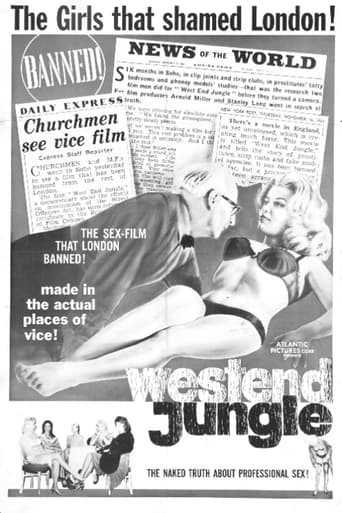Phil Clark
Straight-ahead exploitation film from a director of nudie flicks (oh and exec producer of "The Sorcerers", which is actually a good movie). Hardly shocking, more comical, although still banned by the BBFC on initial release. England in the early Sixties must have been more prudish than previously thought.There are some funny moments with a lot of non-actors "doing acting", and the spy-jazz theme tune is a swinging number (it gets replayed many times for extra value). I'd say the real interest, though, is the shots of a long-lost vintage Soho: a world away from today's tourist attraction.Half marks, for genuine Z-grade/camp/period piece/curiosity value. Seekers of smut should, however, look elsewhere.
Marlburian
Bob the Moo has said it all really, and there's not much to add to his comments. Almost fifty years later, it's difficult to see what all the fuss was about - one sees worse on pre-watershed TV. All the characters are tawdry: the men are seedy and the girls unattractive. The one exception is the fan-dancer who has a few seconds towards the end of the film: she's a nice-looking girl and obviously a professional artiste.Apart from the censorious voice-over, the striking impression was the constant smoking - one wonders what the mortality rate from cancer was among night-club hostesses and patrons.
bob the moo
This is a really weird little film that should probably be watched in the context of the period but in reality cannot be. Billed as documentary into the seedy side of Soho in the 1960's that was banned outright by the BBFC, I expected quite a hard hitting expose that gets into the world of the hostess and beyond. The truth is that it is nothing of the sort and I doubt it ever was. I don't know the motives of the makers but I'll suggest that they were not strictly coming at this subject from a documentarian point of view. The whole film is played out with what I can only presume are actors and, if not then they are certainly all staged shots. Over this we get a constant narration from a typical "BBC continuity announcer" type and this steady "jaunty" music.Having already put the idea of a documentary out of my mind, the narration suggested this was going to be a cautionary film for soliciting girls, much like Reefer Madness was for drug use. The narration lays this on thick, making the girls seem dirty ("a girl who could do with a good wash" being one great line) and the men who buy their time in these clubs as idiots throwing their money away. It continues with this but then at the same time it seems to take a certain amount of pleasure in showing the girls in low-cut tops, doing a fan dance and the like. This strange duality hurts the film a great deal because it is too clumsy and conflicted to work as a warning but yet too tame to serve as titillation – even, I'm guessing, for the period.The only thing that this leaves the film to do is to be a "Reefer Madness" of our period. By this I mean it incredibly dated in its content, style and approach. It is unbearably judgmental and nanny-ish in its tone and the way the voices of the "cast" are narrated on top is laughable. I didn't really get a feel for the scale of the problem (or indeed what the problem was at all) but I did get plenty of amusing moments about how the world has changed. My favourite of these is a reference to the "new status symbol" that brings more prestige than company stationary or anything else – what is it? The credit card! If only they could see us now.West End Jungle is a dated curio that doesn't deserve the attention it gets from having been banned for as long as it was. It is conflicted in what it is trying to do and ends up doing nothing much of interest or value. Worth a chuckle as a dated piece of nonsense but not anything more than that.
simon-1303
Seamy or at least black and white expose of 1950's London's sex trade in all its guises. Using actors and clearly of the period, this reveals and condemns all the tricks of the trade, from call girls to clip joints and high massage parlours to low class walk ups. It's hard to know which are less appealing: the deluded and self-deluded and desperate punters or the calculating and equally desperate working girls. The film condemns them equally, while revealing in details the titillation and barely legal disrobing designed to arouse man's baser desires. With a voice-over straight from the Department of Public Morals, and fascinating glimpses of a period long ago, this has something for everyone. Huge potential for unintentional humour and entirely convincing as to the facts of the case.



